
1 DRAWING UNDERPINS EVERYTHING
Andy Warhol is best known for his bold silkscreen prints, yet all the qualities that defined his most famous artworks were evident right from the very beginning. The reductive lines, the bold shapes, the voyeuristic fascination with people – these facets can all be seen in his 1950s drawings, such as Boy with Flowers [part of Tate Modern’s new retrospective], where the influence of artists such as Jean Cocteau and Henri Matisse are most apparent.
Born in Pittsburgh in 1928, Warhol initially worked as a commercial illustrator, producing everything from shoe advertisements to record sleeves. Skilled draughtsmanship underpinned everything that he did.
If drawing is not your strong point, don’t worry though. Warhol often traced around projections of photographs during his early years to get the desired effects. In fact, without relying on these rudimentary methods, he may never have alighted on his most famous process. After all, his fondness for both using tracing paper to repeat images and blotting ink lines while still wet to create variations in the line are precursors of his silkscreen methods.
2 EMBRACE REPETITION
Andy Warhol’s first solo exhibition of Pop Art took place in New York in 1962. It was here that he debuted his first silkscreen-printed canvases featuring repeated images of subjects including dollar bills and soup cans. “The reason I’m painting this way is that I want to be a machine,” he famously told Art News, a reference to his newly-discovered process.
While repeating the same motif may seem like a lazy way to fill a canvas, I like to think of Warhol’s approach in terms of Claude Monet’s series paintings, which depicted the same subject from the same angle under differing conditions.
この記事は Artists & Illustrators の April 2020 版に掲載されています。
7 日間の Magzter GOLD 無料トライアルを開始して、何千もの厳選されたプレミアム ストーリー、9,000 以上の雑誌や新聞にアクセスしてください。
すでに購読者です ? サインイン
この記事は Artists & Illustrators の April 2020 版に掲載されています。
7 日間の Magzter GOLD 無料トライアルを開始して、何千もの厳選されたプレミアム ストーリー、9,000 以上の雑誌や新聞にアクセスしてください。
すでに購読者です? サインイン

Still life IN 3 HOURS
Former BP Portrait Award runner-up FELICIA FORTE guides you through a simple, structured approach to painting alla prima that tackles dark, average and light colours in turn
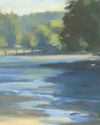
Movement in composition
Through an analysis of three masterworks, landscape painter and noted author MITCHELL ALBALA shows how you can animate landscape composition with movement
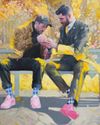
Shane Berkery
The Irish-Japanese artist talks to REBECCA BRADBURY about the innovative concepts and original colour combinations he brings to his figurative oil paintings from his Dublin garden studio

The Working Artist
Something old, something new... Our columnist LAURA BOSWELL has expert advice for balancing fresh ideas with completing half-finished work
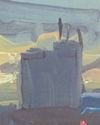
Washes AND GLAZES
Art Academy’s ROB PEPPER introduces an in-depth guide to incorporating various techniques into your next masterpiece. Artwork by STAN MILLER, CHRIS ROBINSON and MICHELE ILLING
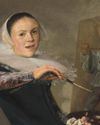
Hands
LAURA SMITH continues her new four-part series, which encourages you to draw elements of old master paintings, and this month’s focus is on capturing hands
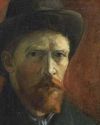
Vincent van Gogh
To celebrate The Courtauld’s forthcoming landmark display of the troubled Dutch master’s self-portraits, STEVE PILL looks at the stories behind 10 of the most dramatic works on display
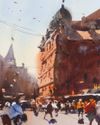
BRING THE drama
Join international watercolour maestro ALVARO CASTAGNET in London’s West End to paint a dramatic street scene
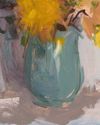
Serena Rowe
The Scottish painter tells STEVE PILL why time is precious, why emotional responses to colour are useful, and how she finds focus every day with the help of her studio wall

Bill Jacklin
Chatting over Zoom as he recovers from appendicitis, the Royal Academician tells STEVE PILL about classic scrapes in New York and his recent experiments with illustration